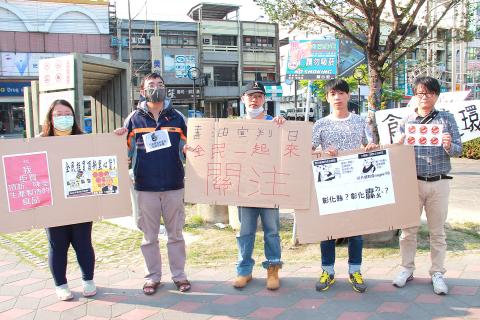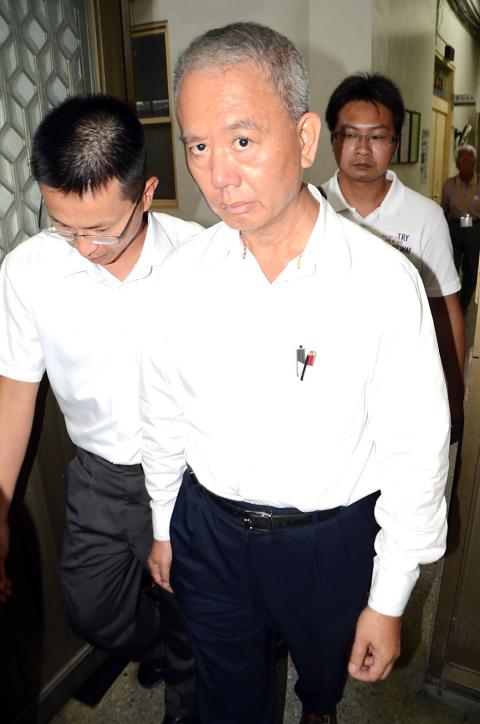Defendants in an adulterated cooking oil case that shook the nation last year, including former Ting Hsin International Group (頂新集團) executive Wei Ying-chun (魏應充), were found not guilty of breaching the Act Governing Food Safety and Sanitation (食品安全衛生管理法) by the Changhua District Court yesterday.
The Changhua County Prosecutors’ Office in October last year charged former Ting Hsin Oil and Fat Industrial Co (頂新製油實業) chairman Wei over violations of the act after investigators found the company had imported animal feed-grade material from Vietnam-based oil manufacturer Dai Hanh Phuc Co (大幸福) and declared it to customs as fit for human consumption. It was then used to make oil for cooking and making pastry.
At the time, prosecutors asked for a 30-year prison sentence for Wei, while asking for 18 years each for 59-year-old former Ting Hsin Oil and Fat general manager Chang Mei-feng (常梅峰), 43-year-old former acting president Chen Mao-chia (陳茂嘉) and 56-year-old Yang Chen-yi (楊振益), the owner of Dai Hanh Phuc.

Photo: Chen Kuan-pei, Taipei Times
The prosecutors also recommended the confiscation of allegedly illegal profits Ting Hsin International Group made from the oil products, totaling NT$440 million (US$13.4 million).
Yesterday’s ruling said prosecutors failed to prove that Ting Hsin Oil and Fat sourced fat extracted from unhealthy animals or that the company’s products were manufactured using unsanitary processes.
The defendants could not be proved to have committed the crimes they were charged with and are therefore not guilty, it said.

Photo: Yen Hung-chun, Taipei Times
The case can be appealed.
Wei resigned as chairman of Ting Hsin Oil and Fat, Cheng I Food Co (正義股份) and Wei Chuan Foods Corp (味全食品工業) — all companies controlled by the family-run Ting Hsin International Group — after the firms were found to be producing questionable oil products.
In a statement released after the ruling, the group said it respects the court’s decision and would accept all criticism from society, adding it would seek to give back to Taiwan, which it considers its home, as much as possible.
Netizens and civic groups reacted angrily to the ruling.
Saying the verdicts were vastly different from what the public expected, many netizens said that the nation’s judiciary was dead.
One netizen sarcastically said that he was glad to hear the ruling because it meant the oil he consumed over the past decade was safe and that he had not consumed tainted oil products for a decade or more.
Homemakers United Foundation secretary-general Lai Hsiao-fen (賴曉芬) called on consumers to boycott Ting Hsin’s products in light of the ruling, adding that consumers should use their autonomy and make corporations pay a price for malfeasance.
Former Taipei District Prosecutors’ Office head prosecutor Hu Yuan-lung (胡原龍), who had been involved in the investigation of the case, said the discrepancy between public expectations and the ruling was due to the hastiness of the Changhua County Prosecutors’ Office.
The Changhua office investigated for only eight days before it indicted the defendants, Hu said, adding that the investigation could not find substantial evidence to back the allegations, which was the prime reason the collegiate benchruled the way it did
The Food and Drug Administration said it would cooperate with the Changhua office to provide evidence, vowing to appeal the ruling.
Linkou Chang Gung Memorial Hospital department of clinical toxicology director Yen Tsung-hai (顏宗海) said that cooking oils have few categories of inspection, most of which only search for total polar compounds and heavy metals, but there could be other harmful ingredients in oils.
National Taiwan University (NTU) toxicology professor Chiang Chih-kang (姜至剛) called on legal amendments to define items that can cause chronic toxicity, while NTU’s Food Safety Center executive officer Hsu Fu (許輔) said the government should grant food inspection controllers more power to prevent food safety incidents.
Additional reporting by Chen Ping-hung and Wu Liang-yi

TRAGEDY STRIKES TAIPEI: The suspect died after falling off a building after he threw smoke grenades into Taipei Main Station and went on a killing spree in Zhongshan A 27-year-old suspect allegedly threw smoke grenades in Taipei Main Station and then proceeded to Zhongshan MRT Station in a random killing spree that resulted in the death of the suspect and two other civilians, and seven injured, including one in critical condition, as of press time last night. The suspect, identified as a man surnamed Chang Wen (張文), allegedly began the attack at Taipei Main Station, the Taipei Fire Department said, adding that it received a report at 5:24pm that smoke grenades had been thrown in the station. One man in his 50s was rushed to hospital after a cardiac arrest

SAFETY FIRST: Double the number of police were deployed at the Taipei Marathon, while other cities released plans to bolster public event safety Authorities across Taiwan have stepped up security measures ahead of Christmas and New Year events, following a knife and smoke bomb attack in Taipei on Friday that left four people dead and 11 injured. In a bid to prevent potential copycat incidents, police deployments have been expanded for large gatherings, transport hubs, and other crowded public spaces, according to official statements from police and city authorities. Taipei Mayor Chiang Wan-an (蔣萬安) said the city has “comprehensively raised security readiness” in crowded areas, increased police deployments with armed officers, and intensified patrols during weekends and nighttime hours. For large-scale events, security checkpoints and explosives

A car bomb killed a senior Russian general in southern Moscow yesterday morning, the latest high-profile army figure to be blown up in a blast that came just hours after Russian and Ukrainian delegates held separate talks in Miami on a plan to end the war. Kyiv has not commented on the incident, but Russian investigators said they were probing whether the blast was “linked” to “Ukrainian special forces.” The attack was similar to other assassinations of generals and pro-war figures that have either been claimed, or are widely believed to have been orchestrated, by Ukraine. Russian Lieutenant General Fanil Sarvarov, 56, head

PUBLIC SAFETY: The premier said that security would be tightened in transport hubs, while President Lai commended the public for their bravery The government is to deploy more police, including rapid response units, in crowded public areas to ensure a swift response to any threats, President William Lai (賴清德) said yesterday after a knife attack killed three people and injured 11 in Taipei the previous day. Lai made the remarks following a briefing by the National Police Agency on the progress of the investigation, saying that the attack underscored the importance of cooperation in public security between the central and local governments. The attack unfolded in the early evening on Friday around Taipei Main Station’s M7 exit and later near the Taipei MRT’s Zhongshan